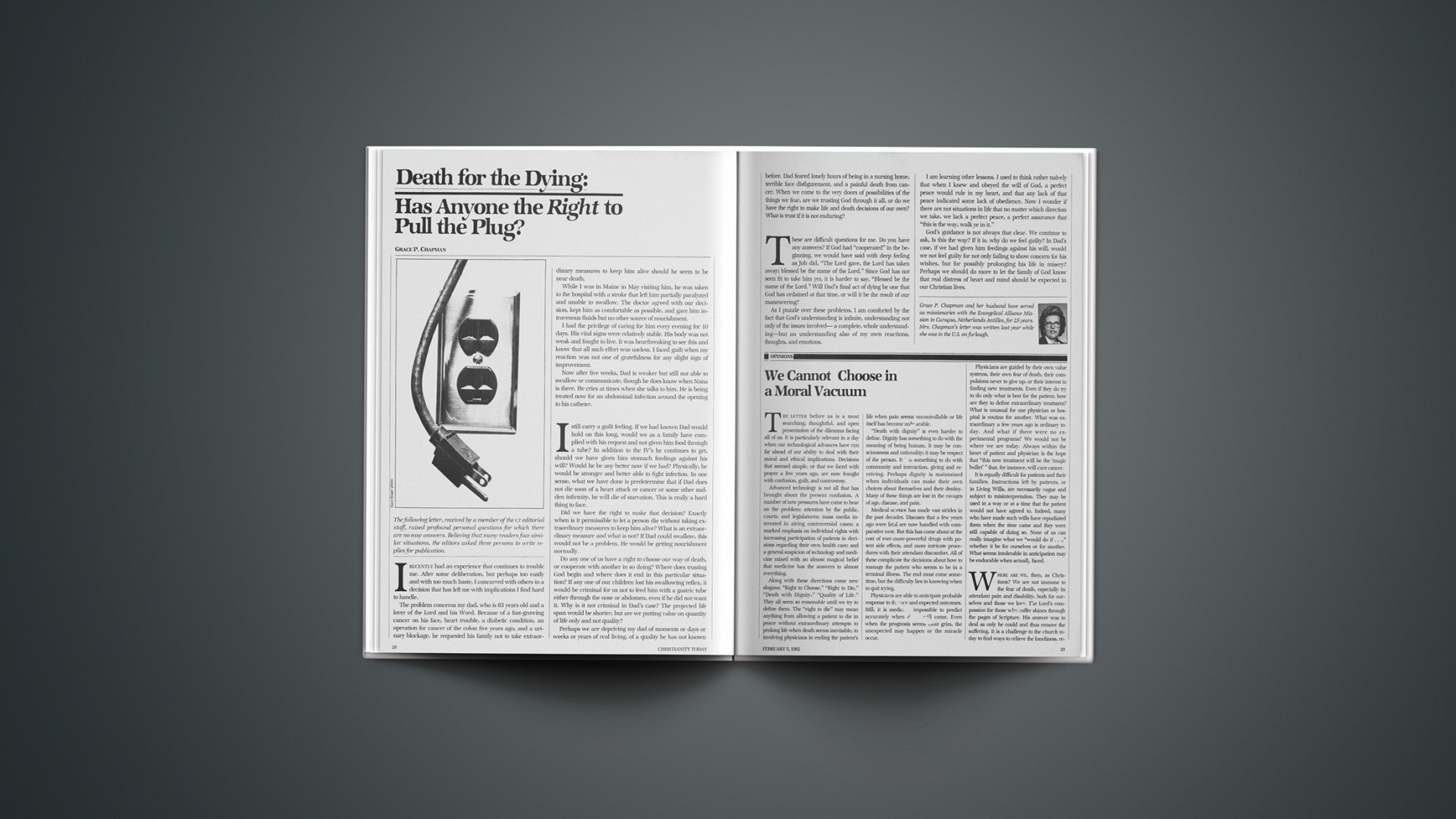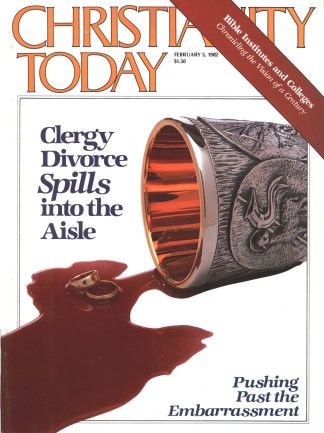The following letter, received by a member of the CT editorial staff, raised profound personal questions for which there are no easy answers. Believing that many readers face similar situations, the editors asked three persons to write replies for publication.
I recently had an experience that continues to trouble me. After some deliberation, but perhaps too easily and with too much haste, I concurred with others in a decision that has left me with implications I find hard to handle.
The problem concerns my dad, who is 83 years old and a lover of the Lord and his Word. Because of a fast-growing cancer on his face, heart trouble, a diabetic condition, an operation for cancer of the colon five years ago, and a urinary blockage, he requested his family not to take extraordinary measures to keep him alive should he seem to be near death.
While I was in Maine in May visiting him, he was taken to the hospital with a stroke that left him partially paralyzed and unable to swallow. The doctor agreed with our decision, kept him as comfortable as possible, and gave him intravenous fluids but no other source of nourishment.
I had the privilege of caring for him every evening for 10 days. His vital signs were relatively stable. His body was not weak and fought to live. It was heartbreaking to see this and know that all such effort was useless. I faced guilt when my reaction was not one of gratefulness for any slight sign of improvement.
Now after five weeks, Dad is weaker but still not able to swallow or communicate, though he does know when Nana is there. He cries at times when she talks to him. He is being treated now for an abdominal infection around the opening to his catheter.
I still carry a guilt feeling. If we had known Dad would hold on this long, would we as a family have complied with his request and not given him food through a tube? In addition to the IV’s he continues to get, should we have given him stomach feedings against his will? Would he be any better now if we had? Physically, he would be stronger and better able to fight infection. In one sense, what we have done is predetermine that if Dad does not die soon of a heart attack or cancer or some other sudden infirmity, he will die of starvation. This is really a hard thing to face.
Did we have the right to make that decision? Exactly when is it permissible to let a person die without taking extraordinary measures to keep him alive? What is an extraordinary measure and what is not? If Dad could swallow, this would not be a problem. He would be getting nourishment normally.
Do any one of us have a right to choose our way of death, or cooperate with another in so doing? Where does trusting God begin and where does it end in this particular situation? If any one of our children lost his swallowing reflex, it would be criminal for us not to feed him with a gastric tube either through the nose or abdomen, even if he did not want it. Why is it not criminal in Dad’s case? The projected life span would be shorter, but are we putting value on quantity of life only and not quality?
Perhaps we are depriving my dad of moments or days or weeks or years of real living, of a quality he has not known before. Dad feared lonely hours of being in a nursing home, terrible face disfigurement, and a painful death from cancer. When we come to the very doors of possibilities of the things we fear, are we trusting God through it all, or do we have the right to make life and death decisions of our own? What is trust if it is not enduring?
These are difficult questions for me. Do you have any answers? If God had “cooperated” in the beginning, we would have said with deep feeling as Job did, “The Lord gave, the Lord has taken away; blessed be the name of the Lord.” Since God has not seen fit to take him yet, it is harder to say, “Blessed be the name of the Lord.” Will Dad’s final act of dying be one that God has ordained at that time, or will it be the result of our maneuvering?
As I puzzle over these problems, I am comforted by the fact that God’s understanding is infinite, understanding not only of the issues involved—a complete, whole understanding—but an understanding also of my own reactions, thoughts, and emotions.
I am learning other lessons. I used to think rather naïvely that when I knew and obeyed the will of God, a perfect peace would rule in my heart, and that any lack of that peace indicated some lack of obedience. Now I wonder if there are not situations in life that no matter which direction we take, we lack a perfect peace, a perfect assurance that “this is the way, walk ye in it.”
God’s guidance is not always that clear. We continue to ask, Is this the way? If it is, why do we feel guilty? In Dad’s case, if we had given him feedings against his will, would we not feel guilty for not only failing to show concern for his wishes, but for possibly prolonging his life in misery? Perhaps we should do more to let the family of God know that real distress of heart and mind should be expected in our Christian lives.
Grace P. Chapman and her husband have served as missionaries with the Evangelical Alliance Mission in Curaçao, Netherlands Antilles, for 25 years. Mrs. Chapman’s letter was written last year while she was in the U.S. on furlough.










